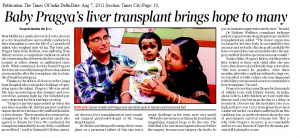
Baby Pragya’s liver transplant brings hope to many
Baby Pragya’s liver transplant brings hope to many
Source : Durgesh Nandan Jha, TNN Aug 7, 2011, 05.01am IST
NEW DELHI: In a medical record of sorts, doctors at a city hospital have successfully conducted a liver transplant to save the life of a 7-month-old infant who weighed only 4.6 kg. The baby girl, Pragya Saha from Kolkata, was suffering from Biliary atresia, a congenital condition in which the connecting duct between the liver and the intestines is either absent or malformed since birth. When examined, doctors found Pragya’s liver was irreversibly damaged but today, almost seven months after the transplant, she is a bundle of health and energy.
Thanks to the efforts of doctors at Sir Ganga Ram Hospital who took up the challenge of operating upon the infant, Pragya’s life was saved. She was operated upon this January and recovered fast, gaining eight kg. Her delighted parents celebrated her first birthday recently.
 “Pragya’s parents approached us when she was three months old. But her parents could not donate their liver because they suffered from fatty liver disease. Three months they returned accompanied by the child’s paternal uncle who agreed to donate his liver. We conducted the transplant immediately as any delay could have proved fatal,” said Dr Naimish N Mehta, associate director, liver transplantation and consultant surgical gastroenterologist at Sir Ganga Ram Hospital.
“Pragya’s parents approached us when she was three months old. But her parents could not donate their liver because they suffered from fatty liver disease. Three months they returned accompanied by the child’s paternal uncle who agreed to donate his liver. We conducted the transplant immediately as any delay could have proved fatal,” said Dr Naimish N Mehta, associate director, liver transplantation and consultant surgical gastroenterologist at Sir Ganga Ram Hospital.
Dr Mehta said that performing a liver transplant on a premature infant of this size was a major challenge as the veins were very small. “We had to use sutures as thin as hair and special magnifying surgical loops to fix the cuts. The child had to be vaccinated against disease before the surgery because post-surgery she had to be put on immunosuppressive medicines,” he said.
Dr Nishant Wadhwa, consultant incharge pediatric gastroenterology, hepatology and liver transplantation added: “The donor organ was too large for her tiny body. So acceptability was an issue and we had to fix the graft carefully. We have reviewed the case six months after the surgery and feel that the operation was successful.”
Sanjoy Saha, Pragya’s father, said that when they looked at their only child after she was born, they detected a yellowish tinge to her skin. “She was treated for jaundice. After three months, when the condition refused to improve, we travelled to Delhi where she was diagnosed with Biliary atresia and doctors recommended a liver transplant,” he said.
Pragya’s case has raised hopes for thousands of infants born with Biliary atresia. In India, about 3,000 to 4,000 children are born with this disease each year but most die due to a delay in treatment. Doctors say the mortality rate is as high as 80 per cent. Liver transplants have been conducted earlier on infants suffering from this condition but, as medical reports show, the rate of post-surgery survival remains low. This is why little Pragya’s recovery is so remarkable and serves as a beacon of hope for the many parents still looking for a cure.








